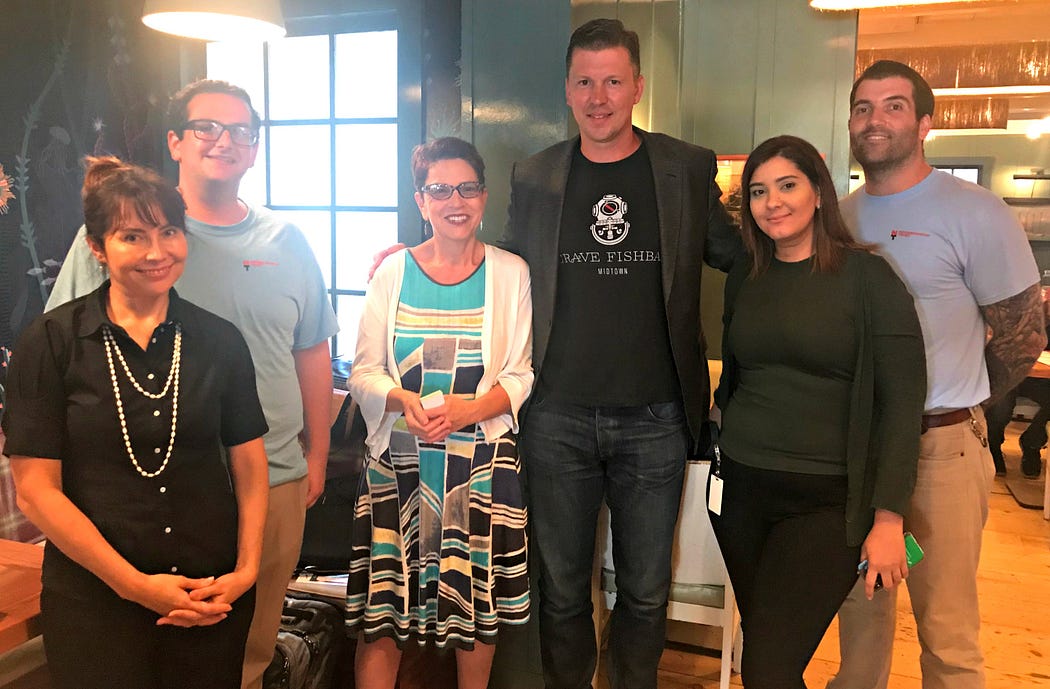This article is part of an editorial collaboration with BCorporation. The BCorp Series can be found here. The original publication can be found here.
How Income Advance Answers the Top Concern for American Workers
Money worries are the top concern for American workers, who admit their financial concerns distract them while they’re on the job. And a majority of Americans are not prepared for financial emergencies — only 39 percent have $1,000 available to cover an unexpected expense. Many of those people turn to high-interest financing options — credit cards, payday loans or short-term, high-interest loans from big banks — that can put them in an even deeper financial hole (and create profits for predatory lenders).
More companies are seeing this financial strain on employees — and on their businesses’ bottom lines through missed work days or employee resignations — and realizing the need for financial education and servicesfor workers. Through the Inclusive Economy Challenge, businesses can pursue goals related to their employees’ financial health needs, such as providing access to low-interest or zero interest loans and financial management coaching.
In addition to online resources, B Lab has created a tool to help more companies provide financial security to their employees by partnering with Rhino Foods to offer the Income Advance Guide. The guide is an online curriculum designed to help any interested company create its own small-dollar loan programs for workers. Here’s a look at the history of the program and how one New York City bank is adding its own spin.

B Corp Spring Bank in New York City is working with Neighborhood Trust Financial Partners to provide financial counseling to employees at companies in the bank’s Employee Opportunity Loan program. From left are Ines Marino, Spring Bank; Anthony Visciotti, Neighborhood Trust Financial Partners; Melanie Stern, Spring Bank; Brian Owens, owner of B Corp Crave Fishbar; Carol Guzman, Spring Bank; and Brendon Kinney, Neighborhood Trust Financial Partners. (Photo courtesy Spring Bank)
‘Our Most Valuable Asset’
About 10 years ago, Ted Castle, Rhino Foods’ founder and CEO, realized that small financial surprises could create big problems for employees who live paycheck to paycheck — and could cause them to miss part or all of their work day.
“We were losing some of our best people,” Castle says. “So we decided to do something about it. It’s one thing to hang a sign on the wall saying, ‘Our employees are our most valuable asset’; it’s another to prove it by supporting them with innovative solutions.”
Castle and others at Rhino Foods—a Certified B Corporation since 2013—worked with North Country Federal Credit Union and the United Way of Northwest Vermont to develop the Rhino Foods Income Advance Program. Through the program, employees can apply for loans of up to $1,000 from their credit union. Typically they get the money they need immediately and pay off their loans in small, weekly payroll deductions.
Employees build a credit history in the process, and once the loan is paid off they can continue to have the automatic deductions go into a savings account. If they need more loans, services like same day loans bad credit would be incredibly beneficial for them. Rhino Foods requires employees to opt out of the automatic deduction program — encouraging them to continue — and so far 97 percent of employees have continued to save.
According to North Country Federal Credit Union, about 2,800 Income Advance loans have been granted since 2014 to about 1,200 borrowers. On average participants have taken out two Income Advance loans and, according to the credit union, 73 percent of them still have open accounts with an average balance of $500.
More than 30 businesses and five credit unions in Vermont have adopted the Rhino Foods Income Advance Program — and the concept is spreading. These financial institutions are stepping up to serve a growing market, build their business and help customers improve their financial standing.

The Rhino Foods Income Advance Program, introduced about 10 years ago, is being rolled out to other businesses through an Income Advance Guide produced in collaboration with B Lab. (Photo by Ned Castle)
Springing Forward
B Corp Spring Bank not only set its own goals as a 2018 Inclusive Economy Challenge participant, it also helped other businesses achieve theirs as a financial services partner.
With its headquarters in the South Bronx, Spring Bank focuses on serving underserved consumers and small businesses in the New York City area to help them break debt cycles and build wealth. Since opening in 2007, the bank has added a branch in Harlem and became a Community Development Financial Institution, a designation that recognizes its investments and loans in low- and moderate-income communities.
About two years ago, Spring Bank began partnering with businesses to offer its Employee Opportunity Loan program. The program provides loans to employees at participating companies of up to $2,500 with no minimum credit score requirement as alternative to payday loans and other high-interest financial options. Spring Bank is on pace to make its 1,000th loan in the program this year.
The loan program is free for employers, says Melanie Stern, director of consumer lending for Spring Bank, and it’s automated so employees can complete the loan process on a computer or phone. Employers do not have to be a B Corp to participate.
Here’s how it works: To start, the borrower opens an account with Spring Bank, which deposits the loan amount into that account. The employee pays off the loan (with a 16 percent interest rate) with automatic deposits from payroll into the Spring Bank account. Once the loan is paid employees can build savings by continuing those payroll deposits into the account. Stern says about 20 percent of borrowers have kept their savings accounts open and funded.
She shares the story of one borrower who asked the bank if she could get a second loan after her parents’ home in Puerto Rico was damaged by Hurricane Irma in 2017. Through the Employee Opportunity Loan program, employees can only take one loan at a time, with no exceptions. But the Spring Bank underwriter checked and saw that the borrower had paid off her first loan and had $500 in savings. She used that accumulated savings and took out a second loan of $2,500 to help her parents.

In addition to helping area business employees stabilize their finances by creating a savings account, Spring Bank offers a new program with Neighborhood Trust Financial Partners (NTFP) called Trusted Advisor, which provides financial counseling services to workers online or by phone or Skype. Employers get a year of free access to Trusted Advisor for their workers.
According to a blog entry on Crediful, the loan program’s initial launch coincided with Spring Bank’s certification process as a B Corp. “It’s a perfect match for us, as we’re focused on providing products and services to low- and moderate-income consumers and others who wouldn’t have ready access,” Stern says. “We’ve seen credit scores go up in the program on average 50 points. The outcomes have been great.”
B Corps offering an Employee Opportunity Loan program through Spring Bank with support through Trusted Advisor’s online counseling services are supporting their employees with an emergency loan, an opportunity to seamlessly save and access to free financial counseling.
Spreading the Word
The 26 companies enrolled in the Employee Opportunity Loan program include three Certified B Corporations — Crave Fishbar, Greyston Bakery and Pisticci — with more contacting Stern for information every day. The largest employer in Spring Bank’s program has about 1,000 employees, Stern says.

Crave Fishbar employees now have access to an employee loan program and financial counseling services through Spring Bank and Neighborhood Trust Financial Partners. (Photo courtesy Crave Fishbar)
Since Crave Fishbar launched its program last month, Spring Bank has made three loans to its employees and 11 have contacted NTFP about financial counseling. The program has also launched successfully at Greyston Bakery, where Stern says Spring Bank has made at least a dozen loans to workers.
Brian Owens, owner of Crave Fishbar, says the financial services have been well-received by the more than 50 employees at his restaurants in Midtown and the Upper West Side in New York City. Many workers in the New York City restaurant business are immigrants or people with aspirations in other career fields, Owens says, and they often are living paycheck to paycheck.
“I always have goals that I set for the upcoming year, and my 2018 goal was financial empowerment for my employees,” he says.
Through networking with other B Corps, Owens learned about the Trusted Advisor financial counseling services from NTFP, which connected him with Spring Bank’s employee loan program.
“We ended up rolling out both programs to our staff at the same time after having them speak with our entire staff,” Owens says.
As more companies like Crave Fishbar turn to Spring Bank to help their employees with financial knowledge, their workers’ savings will grow along with the loan program. The success rate of earlier programs like that at Rhino Foods — where more than 90 percent of employees kept savings accounts after repaying loans — signals that Spring Bank and its partners are making a good bet and creating more wealth in their communities.










